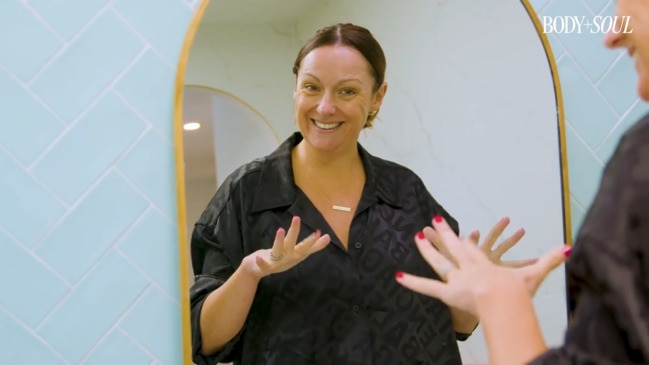Is body acceptance the missing ingredient to better health?
It’s something we all struggle with

Lifestyle
Don't miss out on the headlines from Lifestyle. Followed categories will be added to My News.
Should we keep battling to lose weight, or is body acceptance the key to a happy, healthy life? Here’s what one expert thinks.
The bathroom scales have long taunted women and girls. Many of us watched as our mothers dutifully stepped on, hearts pounding in anticipation, waiting for the screen to flash a number with the authority to determine the course of their day.
Did the number go down? 'I must have done something right!' Did it stay the same? 'Well, I’ll have to try harder!' Did it go up? 'I can’t believe I’m failing… again.'
A dedication to being thin has been drilled into women in the developed world since birth. Only recently has there been wider education about the many factors affecting body weight and how ineffective the scale can be in revealing our health status. But for those who have spent decades tracking their body’s metrics, and fighting against the bathroom scale each morning, the habit can be difficult to break.

While the debate surrounding weight and health rages on – so complex it’s hard to see the forest for the trees – there is one thing both experts and those with lived experience alike can agree on: diets simply don’t work for the majority of people in the long term.
Despite billions of dollars and seemingly limitless resources dedicated to uncovering the silver bullet of weight management, it seems we’ve fallen short, nd many of us have wasted a lot of precious time in the process. With all of that in mind, could it be time to give body acceptance a red-hot go? And if so, how do you start?

The origins of the body acceptance movement
By now, you’ve likely heard of the body positivity movement. After all, earlier iterations of the concept have been around for more than 50 years. Its origins date back to the late 1960s when groups in the US began forming with the goal of promoting fat acceptance.
The movement spread worldwide over the next 20 years, with activists raising awareness about the diet industry and the mistreatment of people in fat bodies. The term ‘body positivity’ was born with the advent of the internet, where the movement really picked up speed propelled by social media hashtags.
Following such widespread exposure to the concept of loving one’s body just the way it is, many influencers with considerable privilege became the biggest advocates for the movement. The hashtag would often accompany posts from creators with socially acceptable body types pointing out their ‘flaws’ by zooming in on small stomach creases or a patch of cellulite.
And while body positivity should be for everyone, this focus on the liberation of people who already experience comparable acceptance from the outside world worked to quieten the voices of people in more marginalised bodies.

What body acceptance means for us today
This is one of the reasons why many people prefer using the terms, ‘body acceptance’ or ‘body neutrality when talking about embracing your body just the way it is. Another is that these terms don’t obligate us to celebrate our bodies as such, they simply encourage us to accept our bodies as they are and treat them with respect and care.
Sarah Liz King is a health at every size (HAES) exercise physiologist and health coach who works with clients on honouring their bodies while focusing on improving their well-being without the need to change their size.
She explains body acceptance as one of the many concepts in the realm of body image work that “focuses on embracing and respecting your body size, shape or appearance as it is now, without judgement or criticism.”
So that we can distinguish between three of the most widely used concepts, King defines them for us below:
Body positivity: "I choose to love and celebrate my body exactly as it is, embracing its size, shape, and appearance."
Body neutrality: "I see my body neutrally, neither good nor bad based on its size, shape, or appearance."
Body acceptance: "I accept my body as it is today, acknowledging and respecting all thoughts and feelings about its size, shape, or appearance."
So, how could body acceptance make you healthier?

The impact of weight stigma
A lot of research has now been done into the harmful effects of weight stigma on both physical and mental health markers. Weight stigma can include anything from receiving negative messages about your body from media, or those around you, to having medical care withheld due to your weight. And while those in bigger bodies bear the brunt of external weight stigma, people in all body shapes and sizes can experience internalised weight stigma.
Researchers from a 2014 study, published in the Obesity academic journal, looked into the physical health effects of weight stigma, and found that our stress hormones are impacted when we are body-shamed. They set up a scenario where female participants were told they were in a study to examine the hormonal effects of shopping but instead, half were being pulled out and told they wouldn't fit into the clothes.
They found that those who were subjected to this discrimination (or body shaming) had higher cortisol levels than those who hadn’t. Importantly, this result was seen regardless of the participant’s body size. In fact, the researchers reported, “the participants who perceived themselves as heavy exhibited sustained cortisol elevation post-manipulation compared with individuals who did not experience the weight-related stigma.”

The impact of under-eating and over-exercise
Ironically, a focus on weight loss at all costs can lead you further away from your health goals than when you started.
“Diet culture often sells us this dream that if we change our appearance or size, everything else about our lives will magically improve. However, that's not always the case,” agrees King, whose work often involves helping women recover from another common side effect of under-eating and over-exercising.
Long-term under-eating can lead to a whole host of negative health impacts including, reduced bone density, sleep disturbance, a slower metabolic rate, and increased risk of injury. Hypothalamic amenorrhea is a loss of menstruation that can lead to infertility, and two of its risk factors, overexercise and undernourishment, can be hallmarks of many weight loss programs.
While fasting programs are often hailed as a healthy practice, the benefits have been a hot topic of debate in recent times. Some research has found intermittent fasting is linked with both weight loss and longevity in rats (but importantly, humans are not rodents), while other studies have found no benefits beyond weight loss at all.
There are also studies linking fasting habits with poorer heart health, suggesting that intermittent fasting could actually do more harm than good.

The impact of weight cycling
The majority of weight loss programs lead to initial weight loss, followed by steady weight regain in most participants. So naturally, ‘weight cycling’ (where you repeatedly lose and gain weight) is a common outcome of long-term weight loss attempts.
A study published in the New England Journal of Medicine found that weight cycling is a risk factor for heart attacks and death in the general population, and other research has linked weight cycling with an increased risk of depression.

So, where do I start on my body acceptance journey?
“If you've spent a lot of your life hating your body size, shape or appearance I think the first step towards body acceptance is allowing yourself the space to not like every element of the way you look and be okay with that,” shares King, who has plenty of helpful tips for those looking to get started.
#1. Go gently
“Starting a body acceptance journey can feel daunting if you've been at war with your shape or size for quite some time, so be gentle with yourself,” says King.
#2. Seek professional support
King also suggests enlisting a psychologist or counsellor for support in improving body image, and working with health professionals who focus on health behaviours instead of outcomes - you can find a provider directory here.

#3. Shift your thinking
“With body acceptance, you focus on making space for difficult thoughts and feelings without the pressure to change them,” explains King. By inviting an attitude of acceptance rather than looking at your body with distaste or shame, you can slowly work towards creating a more well-rounded picture of where your value lies.
King explains that “improving self-esteem and self-worth comes from untangling our self-worth from our physical appearance or size; not from weight loss alone.”
#4. Add in, don’t take away
“When it comes to your habits around food and exercise, it's about shifting to focus on what you can add in to improve your health and creating sustainable habits, rather than a focus on restriction,” says King. “For example, you could pick up a new type of fruit or vegetable at the store this week or allow yourself to explore a new kind of workout you've always been keen to try.”
The more we can do to embrace the bodies we’ve been given, the better our relationships with ourselves will be. When we work from a place of respect instead of shame, our choices can be driven by how we feel instead of how we look.
This is why King doesn’t recommend focusing on a number on the scale or the back of a nutrition panel. “It's about shifting away from weight loss and focusing on sustainable healthy habits that will respect not deprive our body, which serve us much better in the long run.”
More Coverage
Originally published as Is body acceptance the missing ingredient to better health?




